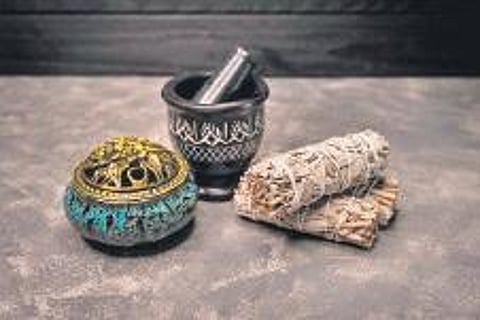

KOCHI: Agarwood (Oudh) products — aromatic attar stored in glass bottles and Oudh chips used as incenses — have been a hit in the Indian markets for decades. It is also the world’s costliest perfume. Now, the ‘liquid gold’ from the Arab nations is thriving in the backyard Mathew Vadakkedath in Kozhikode.
The Aquilaria malaccensis species native to the rainforests of Southeast Asia is commonly found in Assam, the agarwood capital of India. For the past 17 years, Mathew has been growing 35 mature trees alongside saplings in the sprawling two-acre land around his home in Kodencherry.
A farmer by profession, Mathew came across agarwood, the most expensive wood popularly known as ‘The Wood of The Gods’, back in 2003 through a newspaper advertisement. “I knew about the usage of attar and Oudh in West Asia and European countries. After seeing the advertisement I sourced them from Kollam,” says Mathew. With little knowledge about the market value of agarwood, the 69-year-old got 100 saplings brought from Assam for Rs 110. “I planted 40 of them in the land near my house and the rest were given off to my friends and families,” he adds.
In just seven or eight years, the trees in his land grew 70ft high and 80cm wide. The saplings needed very little maintenance. Given the yield, Mathew claims that Oudh saplings tend to grow healthily and fast when planted amidst rubber trees. “The trees which grow rampantly in Assam has been growing better in Kerala’s climate. The workers who are specialised in nurturing agarwoods from Assam told me that they haven’t seen Oudh trees that are 80 cm wide there,” beams Mathew.
Oudh formation
The species Aquilaria malaccensis forms the most Oudh claims Mathew. Oudh/ agarwood is formed only when the tree gets infected. “A specific bee causes the fungal infection. I haven’t seen them to date, but they are said to be golden. When they enter the holes on the tree, an enzyme is produced naturally, resulting in the natural formation of Oudh,” explains Mathew. Such natural fragrant compounds are authentic.
But the frequency of natural fungal infection is extremely low. Surprisingly, around 15 of the mature trees in Mathew’s farm has formed Oudh naturally. Before getting infected, the healthy wood is pale and odourless. When the tree defends the attack of the bees, it produces a stress-induced aromatic resin ‘aloes’, which is dark and moist. Over years, aloes will attach themselves to the heartwood, creating dark coloured agarwood. “When looked from the outside it is hard to know whether Oudh is formed or not. When chopped slightly or drilled 2 inches deep, the black colour can be seen from within. In Assam, out of 100 trees, only one will be infected naturally,” he says.
With advanced studies, artificial fungal treatment has also been developed to create Oudh. “Around 300 holes that are 3.5-inch deep are drilled in and a certain medicine is poured into it. In two months, the black substance is formed around the wood, making it agarwood,” says Mathew.
The resin-filled wood on Mathew’s land can be formed as perfumery and high-quality incense in two years. Once the agarwood is harvested, the skilful workers in Assam separate the healthy pale coloured Aquilaria from the resin-infused chips known as Oudh chips. This requires separate craftsmanship. The chips are used as incense in the middle east. When burnt, its fumes can be used as a perfume on garments and stay for a relatively long period. “The pale-coloured wood can be distilled to form essential oil or attar. Liquid can be formed from the Oudh chips as well, but it would be even more expensive,” says Mathew.
According to Mathew, a kilogram of Oudh chips can cost up to five lakh of rupees, and 12ml of quality attar can cost over a lakh. “I expect to cut the trees after two years, and more Oudh will form on the entire tree,” concludes Mathew.